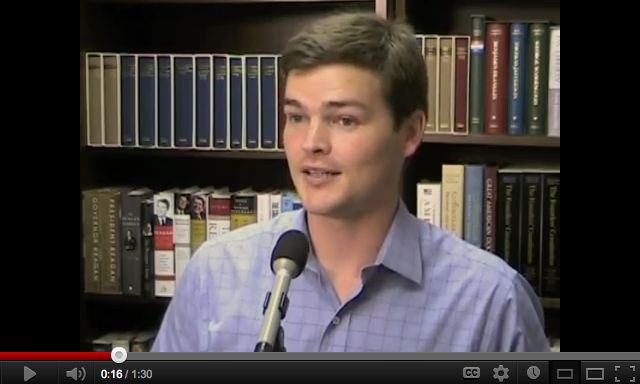ALEC is not Your Enemy
While in Charlotte late last week, I came across a handful of Occupy members protesting the American Legislative Exchange Council. Given my status as an ALEC attendee at the Spring Task Force Summit and the hyperbole of the protestors, one might expect an ugly scene.

However, I was able to engage in a surprisingly productive conversation, and they shared one of their pamphlets with me (pictured). I even share many of their frustrations: political corruption, the prospect of federal indefinite detention, central banking, chaotic immigration,
corporate bailouts, and narrow media coverage.
The concern I expressed to them, and which I would like to extend now, is that attacks on ALEC are misdirected. (Pardon the departure from straight fiscal policy for this week, and I’ll leave other aspects of Occupy Charlotte’s tactics for another day.)
ALEC espouses the noble, Jeffersonian ideals of "limited government, free markets, and federalism." Despite a limited, $7 million budget and members who want to preserve the legitimacy and priorities of the organization, however, it has been on the receiving end of plenty of demonization.
When I actually probed into why these people oppose ALEC, the conversation rapidly shifted away from the organization towards broader concerns. The one exception was their call for a more democratic process with constituent engagement.
The fact is that ALEC is a voluntary, membership organization that assists legislators to collaborate with policy and industry professionals to craft model legislation. It also publishes valuable research on why free markets are important. These model bills and resolutions can be amended and must still go through the democratic process like all others. They are in no way guaranteed passage. Additionally, a deeper examination of ALEC’s work also reveals sensible and non-controversial initiatives such as the National Debt Relief Amendment.
Given the frustration that many of these protestors had, I can see why they would want a target to protest. The problem is that ALEC is not responsible for their lack of job prospects, onerous student debts, or centralized media outlets, among other Occupy complaints. On the contrary, ALEC members are eager to enable more prosperous and decentralized economic environments that bring accountability and opportunity rather than discourage them.
State Spending at a Record High
Last week we released my latest research spotlight, with the finding that state spending is at a record high — three times what is was in the 1970s in per capita terms. That may come as a surprise to many, since there has been so much talk in the media of supposed spending cuts. Here is my explanation in an interview with fellow staff member, Mitch Kokai:
For an in-depth explanation of the analysis behind this report, please consider coming to my next speaking engagement, "The Unreported Growth of Government in North Carolina." Americans for Prosperity is hosting the event at the Warehouse Restaurant, 204 Main Street, Winterville on Saturday, May 26, 2012, 10am-12pm.
Notes
- While in Charlotte, I also caught up with Curtis Olafson, a state legislator from North Dakota. He is the prime promoter of the National Debt Relief Amendment, and I recorded his comments on why other members should rally behind it. However, the quality of the audio is poor, and I recommend this footage for those willing to learn why he supports it.
- An owner of Facebook renounced his United States citizenship last week — another example of someone voting with his feet. His particular instance ought to heighten our awareness of the reality that immigrants are not only potential residents; they are customers (taxpayers) for the region. We would best seek to attract migrants such as him, as the United States has done for so long, rather than drive them away with confiscatory taxation and regulation.
Click here for the Fiscal Insights archive.


